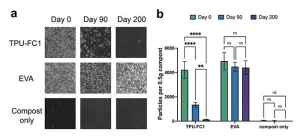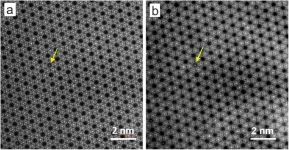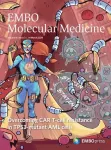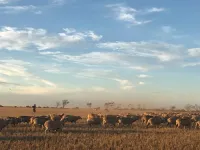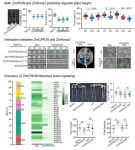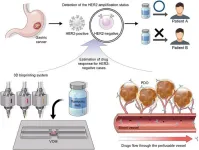(Press-News.org) Reduced snow cover and shifting vegetation patterns in the Alps, both driven by climate change, are having major combined impacts on biodiversity and functioning of ecosystems in the high mountains, according to new research published today.
Mountain ranges covering vast areas of the world are warming much faster than surrounding lowland areas, triggering huge reductions in snow cover and rapid upward movement of dwarf-shrubs, such as heather.
Scientists at The University of Manchester have found that these changes are disrupting the timing of crucial alpine ecosystem functions performed by plants and soil microorganisms.
The research, published today in the journal Global Change Biology and funded by the UK Natural Environment Research Council, shows that high mountain ecosystems may be less capable of retaining the important nutrients needed to sustain plant growth and maintain biodiversity in these harsh environments.
Dr Arthur Broadbent, lead author of the study, said: “Our paper reveals how important the timing of many plant and soil processes are in seasonal ecosystems. People may be familiar with mismatches between plant flowering and the emergence of pollinators caused by climate change. In our study, we have demonstrated that plant and soil processes show fascinating seasonal dynamics, and that the timing of these processes can also be disrupted by climate change. The high mountains are like a canary in the coalmine because they are warming much faster than the global average. That makes our findings particularly alarming.”
Every year, seasonal changes in mountain ecosystems prompt large transfers of nutrients between plants and microbial communities in alpine soils. Following snowmelt in spring, plants start to grow and compete with soil microbes for nutrients, thereby triggering a shift in the storage of nutrients from soil to plants. This transfer is reversed in autumn, as plants die back, and nutrients are returned to the soil within dead leaves and roots.
During alpine winters, snow acts like an insulting blanket that allows soil microbes to continue functioning and store nutrients in their biomass and enables plants to survive cold alpine winters. Climate change is predicted to cause an 80-90% loss of snow cover by the end of the century in parts of the European Alps and advance the timing of snowmelt by five to 10 weeks.
Prof Michael Bahn, a collaborator on the project from the University of Innsbruck, said: "Declining winter snow cover is one of the most obvious and pronounced impacts of climate change in the Alps. Its effects on the functioning and biodiversity of alpine ecosystems are a major concern for people living in Alpine regions and beyond.”
The scientists from The University of Manchester, in collaboration with the University of Innsbruck, Helmholtz Zentrum München, and the Centre for Ecology and Hydrology, carried out the work on a long-term field experiment in the European Alps. The findings highlight the detrimental effect of climate change on seasonal transfers and retention of nutrients between plants and soil microbes.
Richard Bardgett, Principal Investigator and Professor of Ecology at The University of Manchester’s Department of Earth and Environmental Sciences, said “Our work demonstrates how the combination of different facets of climate change can severely disrupt below-ground ecological processes that underpin plant growth in alpine ecosystems, with potential long-term consequences for their biodiversity and functioning.”
For scientists, understanding how ecosystems respond to multiple simultaneous climate change impacts remains a major challenge. Interactions between direct and indirect climate change factors, such as snow cover change or less obvious ones such as dwarf-shrub expansion, can lead to sudden and unexpected changes in ecosystem functioning. These effects are impossible to predict by studying climate change factors in isolation.
-ends-
END
Climate change disrupts vital ecosystems in the Alps
2024-03-21
ELSE PRESS RELEASES FROM THIS DATE:
Say hello to biodegradable microplastics
2024-03-21
Microplastics are tiny, nearly indestructible fragments shed from everyday plastic products. As we learn more about microplastics, the news keeps getting worse. Already well-documented in our oceans and soil, we’re now discovering them in the unlikeliest of places: our arteries, lungs and even placentas. Microplastics can take anywhere from 100 to 1,000 years to break down and, in the meantime, our planet and bodies are becoming more polluted with these materials every day.
Finding viable alternatives to traditional petroleum-based plastics and microplastics has never been more important. New research from scientists ...
New method for analyzing nanoporous materials
2024-03-21
In addition to their main components, the properties of crystalline and nanoporous materials often depend crucially on guest atoms or ions that are embedded in the tiny pores of their lattice structure. This applies to high-tech materials used in sensor or separation technology as well as to natural materials. The bluish gemstone aquamarine, for example, would be colourless without such guest components. Determining the type and position of guest components is difficult, as many materials react sensitively to the radiation emissions ...
An immunotherapy to overcome resistant leukemia
2024-03-21
Acute myeloid leukemia (AML) is an aggressive form of blood cancer. It is caused by mutations in a large number of genes that are acquired in the course of a person’s life. One of these genes – the tumor suppressor gene TP53 – plays a key role. Normally, TP53 helps to prevent the development of tumors. Blood cancer patients in whom this gene is mutated, however, face an extremely poor prognosis, as their genes are resistant to conventional chemotherapeutic agents. Intensive research is therefore being carried out into new therapeutic approaches, ...
The irony of smoking to stay thin: smoking increases belly fat
2024-03-21
The worry of gaining weight is a common excuse for smokers not to quit. A new study published today in the scientific journal Addiction has found that both starting smoking and lifetime smoking may increase abdominal fat, especially visceral fat: the unhealthy fat deep inside the abdomen that is linked to a higher risk of heart disease, diabetes, stroke, and dementia.
Smokers tend to have lower body weights than non-smokers, but they also have more abdominal fat, and more abdominal visceral fat. Visceral fat is hard to see; you can have ...
Healing eyes with contact lenses
2024-03-21
A cross-disciplinary University of Waterloo team has developed a new contact lens material that could act as a bandage for corneal wounds while releasing drugs in a controlled manner to help the eye heal faster.
Typically, corneal abrasion patients spend seven to 10 days wearing a clear, oxygen-permeable bandage contact lens, often instilled with eyedrops containing antibiotics. However, the one-time antibiotic application makes it difficult to ensure enough drugs stay on the eye for sustained treatment.
“It’s a targeted-release drug delivery ...
Excess temperatures cause low flocking concerns
2024-03-21
High temperatures during critical periods of the reproductive cycle of sheep result in 2.1 million fewer lambs produced in Australia each year, costing sheep farmers an estimated $97 million annually.
The work, funded by Meat and Livestock Australia and conducted by a transdisciplinary team of researchers from the University of Adelaide and South Australian Research Development Institute (SARDI), found that days above 32°C during the week of mating caused the significant loss of potential lambs.
Published in Nature Food, the study found annual losses of potential lambs would increase to 2.5 million if median global warming increased ...
The maize ZmCPK39-ZmKnox2 module regulates plant height
2024-03-21
This study was led by Professor Mingliang Xu (College of Agronomy and Biotechnology, China Agricultural University, Beijing, China). Through phylogenic analysis, the authors identified a gene encoding a calcium-dependent protein kinase, ZmCPK39, as a candidate gene for plant height regulation in maize. The function of ZmCPK39 in controlling plant height has been verified using gene editing technology. Compared to the wild-type ND101, knockout of ZmCPK39 significantly reduced plant height by 40%.
The authors further ...
New route to recyclable polymers from plants
2024-03-21
Cellulose, abundantly available from plant biomass, can be converted into molecules used to make a new class of recyclable polymers, to sustainably replace some plastics.
Researchers at Hokkaido University have taken a significant step forward in the drive to make recyclable yet stable plastics from plant materials. This is a key requirement to reduce the burden of plastic pollution in the environment. They developed a convenient and versatile method to make a variety of polymers from chemicals derived from plant cellulose; crucially, these polymers can be fully recycled. The method was published in the journal ACS Macro Letters.
Cellulose is one of the most abundant ...
Revolutionizing gastric cancer treatment through personalized 3D bioprinting
2024-03-21
Gastric cancer ranks among the most widespread diseases in Asian populations, with South Koreans experiencing the third-highest incidence globally in 2020, as reported by the International Agency for Research on Cancer. Recently, a collaborative research effort between Pohang University of Science and Technology (POSTECH) and Yonsei University achieved advancement in the realm of precision personalized medicine for gastric cancer. By using 3D bioprinting to accurately replicate the biological environment surrounding gastric cancer cells, the researchers have achieved a significant ...
How neural inhibition could reduce alcohol use
2024-03-21
LA JOLLA, CA—Neuroscientists at Scripps Research have found that inhibiting neurons involved in the body’s stress response may reduce alcohol consumption in people who have both post-traumatic stress disorder (PTSD) and alcohol use disorder (AUD)—even if they still experience trauma-related anxiety.
The findings were published March 21 in Molecular Psychiatry. These discoveries are helping untangle the complex role that stress and trauma play in neurological disorders like PTSD and AUD, while also informing the development of new treatment options for people who experience both these conditions simultaneously.
“Traumatic ...



